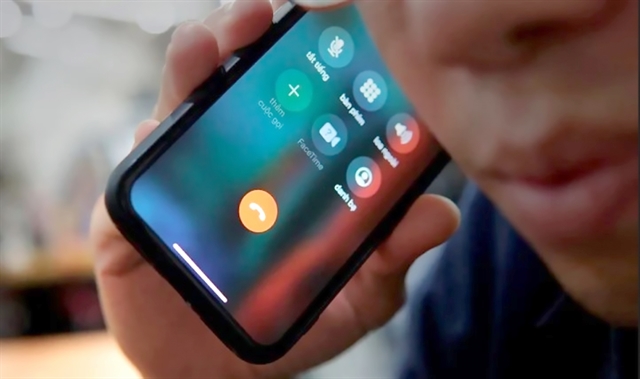 Society
Society

 |
| Spam calls are on the rise and some of them even threaten to share your personal information if you don't keep them on the line. — Illustrative Photo vov.vn |
HÀ NỘI — Receiving spam calls is common among mobile phone users in Việt Nam but many have been threatened recently after telling the invasive callers to stop annoying them.
Hoàng Thị Lan, living in Hà Nội’s Hoàng Mai District, has received spam calls from securities investment consulting companies for one month.
After blocking a spam number, she continued to receive spam calls from another one.
“I can’t block all of them. Some days I received ten spam calls. I have received those kinds of calls for a long time but the number of calls has increased in the last few months.
“I feel annoyed receiving so many calls from unfamiliar numbers, especially around my lunch break,” she told Voice of Vietnam (VOV) newspaper.
Lan said when she asked the callers to stop annoying her, some of them used impolite language and threatened to share her personal information on social media so that other spammers would make calls.
“I can do nothing but block them,” she said.
Đỗ Hữu Trí, deputy chief inspector of the Ministry of Information and Communications (MICs) confirmed that people who refuse advertising services from spam calls have reported being threatened.
The ministry will continue to crack down on unverified SIM cards, especially using the personal information of others to register for SIM cards, he said.
According to the Information Security Department of MICs, in the first half of this year, the number of online fraud cases increased by 64.78 per cent compared to the same period last year and by 37.82 per cent compared to the last six months of 2022.
The ministry’s spam call reporting portals at chongthurac.vn and thongbaorac.ais.gov.vn received nearly 345,000 responses in the first half of this year.
Since May, the ministry and local departments of information and communications established 82 inspection teams to crack down on unverified SIM cards.
Experts from Chống lừa đảo – a non-profit project fighting scams in cyberspace – advised people to hang up on spam calls to avoid wasting time and being threatened. This also helps them reduce their exposure to bad actors and limit the risk of being lured into fraudulent behaviour.
MICs has also recently reported that many people are scammed to download fake apps of the Government and the General Department of Taxation.
According to the Vietnam Cybersecurity Monitoring Centre, people often received phone calls or texts on Zalo and Facebook and are invited to visit the tax office or the police station to register for an electronic ID.
Scammers then ask the victims to download fake apps of the Government and General Department of Taxation on fake websites, disguised as the Google Play Store.
These websites generally have links ending with .apk.
The fake app requires permissions to access personal data. If the user approves them, the scammers can remotely monitor the victim's phone, with their main target being bank account login information.
Scammers will use many tricks to get the OTP code to appropriate money in the victim's account.
Discovering 195 fake apps recently, the Department of Information Security warned that people should not download strange apps or follow instructions of strangers. They should verify information by making phone calls to local taxation or police offices.
People are advised to only download apps on prestigious app stores like Google Play and Apple App Store and to never grant the app full control over the device.
Warning over cyberspace crimes
The Ministry of Public Security issued a warning this week about the main types of fraud in Việt Nam's cyberspace.
They noted fake brands and account hijacking in particular, with 24 types of fraud also reported in cyberspace.
Scammers don't discriminate when choosing targets. Victims can come from all walks of life.
The Ministry of Public Security and the MICs’ Department of Information Security recommend three basic things to ensure personal information safety.
People are advised to limit sharing personal information online unless they are certain that it is used in a controlled manner. Citizens need to ensure that they only provide personal information to trusted individuals and organisations.
Using secure passwords to protect online accounts is another basic step. Users should change their passwords regularly and not use the same one for different accounts.
People need to learn about information security methods, stay up to date with the latest news on security threats and learn how to prevent them. They should also use security tools such as anti-virus software to protect their online accounts. — VNS